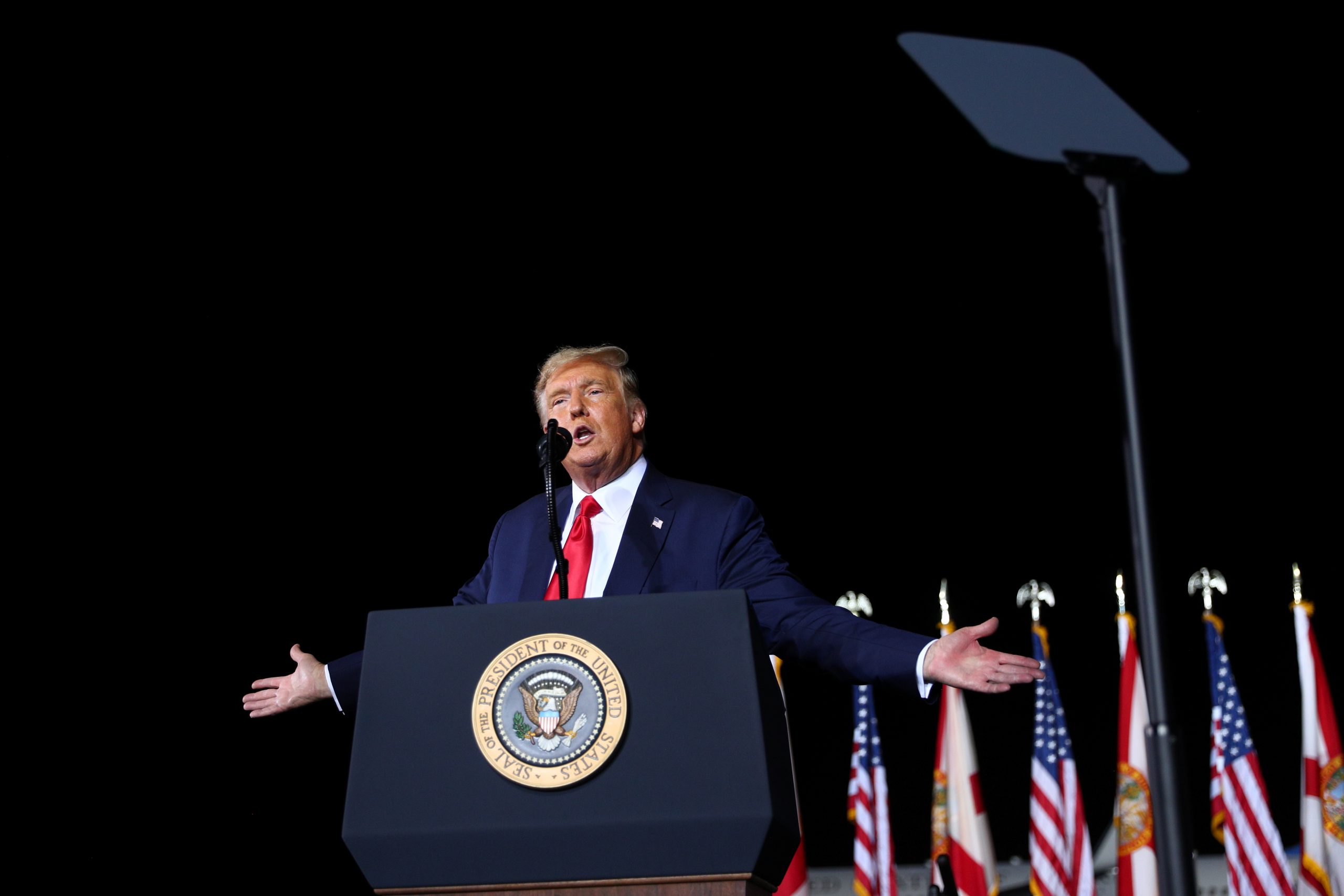President Donald Trump on Friday promised supporters at a rally in Florida that the coronavirus pandemic would end soon and accused Democratic rival Joe Biden of overstating the health crisis to scare Americans into voting for him.
The pandemic, which has killed more than 223,000 people in the United States and cost millions more their jobs, has become the dominant issue of the campaign, with Trump on the defensive over his administration’s handling of the crisis.
Biden earlier in the day said Trump had given up on containing the virus and promised if he wins the Nov. 3 election that he will ask Congress to pass a comprehensive COVID-19 bill which he would sign within the first 10 days of taking office.
“He’s quit on America. He just wants us to grow numb,” Biden said during a speech in his home city of Wilmington, Delaware. “I’m not going to shut down the economy. I’m not going to shut down the country. I’m going to shut down the virus.”
Trump, at the first of two rallies planned on Friday in the battleground state of Florida, mocked Biden for saying in Thursday night’s presidential debate that the United States was entering a “dark winter.”
He said the former vice president and his Democratic allies were trying to scare people by overstating the virus threat.
“We’re going to quickly end this pandemic,” Trump, who has played down the threat since it started, said in The Villages, a sprawling retirement community in central Florida.
“Normal life will fully resume.”
Researchers at the University of Washington’s Institute for Health Metrics and Evaluation on Friday warned the virus could kill more than half a million people in the United States by the end of February 2021. Roughly 130,000 lives could be saved if everybody wore masks, according to the study.
With 11 days left until the election, more than 52 million Americans have already voted, a record-setting pace.
Michael McDonald of the University of Florida’s Elections Project and other experts predict the election could set a modern turnout record, surpassing the 60% participation rate of recent presidential elections.
Intense interest
The surge of early voting points to both intense interest in the race and a population eager to avoid risking exposure in Election Day crowds to COVID-19. The massive early vote total gives the Republican Trump less leeway to change minds before voting concludes.
Opinion polls show him trailing Biden both nationally and, by a narrower margin, in several battleground states that will decide who sits in the White House on Jan. 20, 2021.
Trump said those polls underestimated his support.
“I think we’re leading in a lot of states you don’t know about,” he told reporters at the White House.
Both candidates have showered attention on Florida, a must-win state for Trump where a Reuters/Ipsos poll this week found Biden moving into a slight lead after being in a statistical tie a week earlier.
Former President Barack Obama, with whom Biden served as vice president for eight years, will campaign in Florida on Saturday.
Trump’s campaign manager Bill Stepien said the race was tightening in Minnesota and said the campaign would buy more television advertising there. Opinion polls show Biden leading in the state.
Americans may have to wait days or weeks to know who won as election officials count tens of millions of mail-in votes.
The final debate with Biden on Thursday offered Trump a chance to reverse his fortunes, but analysts said it was unlikely to alter the race in any fundamental way. Preliminary estimates showed that fewer people watched the debate than their first debate in September.
Trump, speaking to thousands of people gathered on a grassy field in The Villages, said he expected to do up to five rallies a day through the last stretch of the race.
Democrats have cast roughly 5 million more votes than Republicans so far, though their margin has shrunk in recent days, according to TargetSmart, a Democratic analytics firm.
Democratic analysts say they are cheered by those numbers but caution that they expect a late surge of Republican votes on Election Day. Republican strategists say strong in-person turnout in Florida, North Carolina and Iowa gives them hope that Trump can win those battleground states again this year.
“It’s really, really hard to compare this to anything,” Democratic strategist Steve Schale told reporters. “Everything’s up from 2016.”
In Texas, a traditionally Republican state that has been growing more competitive, turnout has already reached 71 percent of the 2016 total, according to McDonald. It has reached 50 percent in three southern swing states: Georgia, North Carolina and Florida.
Election officials in battleground states like Pennsylvania are scrambling to minimize the possibility of a disputed outcome.
(Additional reporting by Costas Pitas, Jeff Mason, Jarret Renshaw and Andrea Shalal; Writing by John Whitesides and Andy Sullivan; Editing by Scott Malone, Alistair Bell and Sonya Hepinstall)
























